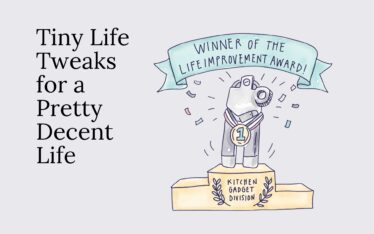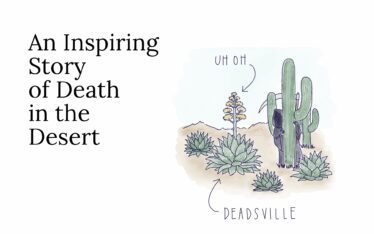When are you at your best in the day? Pick the best answer that applies to your life:
a) I’m a morning person
b) I’m a night owl
c) I’m amazingly productive all day + night long
d) I never really manage to click into gear at all
e) I don’t know; is that bad?
If you answered a, b, or e: keep reading. We’re going to have a good time here.
If you answered c: you’re annoying and you know it. Stay if you must, but just sit quietly in the back.
If you answered d: I’m sorry. Maybe seek help for depression? (And I’m not being flippant. Let’s get you feeling alive again.) You’re welcome to stay, right up in the front row where I can keep an eye on you.
Maximizing your time
Let’s dive in to maximizing your life, shall we? More specifically, we want to maximize your time. You get 4,000 weeks in your life (on average), and chances are you’ve swallowed up a bunch of those already (because let’s be honest: you’re no spring chicken). Since time’s ticking, we need your 168 hours each week you have left to be put to the best use. No more squandering your best hours on email and changing printer cartridges, right?
Time management went out with the Blackberry; now it’s all about energy management. High performers are obsessed with their natural rhythms and know when they’re electrically on and awfully off. They align their tasks to suit their rhythms. Studies show that older adults are typically better at memory and cognitive tasks in the morning, while younger folks usually shine in the afternoon. What could this look like for you, to zero in on your peak energetic times?
4 simple steps to manage your energy (and therefore your productive life):
- Identify your personal peaks and valleys. When are you naturally energized and better able to focus (independent of the artificial boost you get from your triple mocha espresso)? Most reach their optimal zone within 2.5 – 4 hours after waking, and can “zone in” for 90 – 120 minutes max — but you might be different. You might have multiple peaks and valleys in your natural rhythm; just make a note of your specific high and low times. How granular can you get? Write those times down; don’t just mumble “morning” out loud and think you’re going to be more productive. Examples, in case you need some to identify when you’re plugged in vs. zoned out:
-
- First thing in the morning when you sit down to work
- The hour before lunch
- Right before a meeting
- The 45-minute window after you’ve worked out
- The half-hour after a break
- The “rebound” energy high around 4pm (when the end is in sight for the work day)
- One hour after dinner and a glass of wine, before you crash hard
- After a coaching session
- Midnight, when your family is finally asleep
- 3am (God help you)
- After a brownie (not that kind)
-
- Schedule your days to match your energy flow. This isn’t rocket science, right? AND YET YOU’RE NOT DOING IT, SPARKY. (I yell because I care.) (And because I struggle with this, too.) Block off time for your most important, attention-requiring tasks when you have a fresh and alert mind. What this means is that if you’re raring to go at 8am when you sit down to work at your dining room table, and you opt to answer emails about things that other people think are important, you’re missing the point. If 8 – 10am is your prime time, make it your non-negotiable window to churn out quality stuff.
- Relegate the busy work to your down time. You’ve already slotted your strategic, creative, big-picture, quality-thinking time into your golden calendar zone. So now get specific by dumping your busy work into the hours when you’re just about garbage. Responding to (most) emails, handling a pesky IT issue, fixing that customer glitch in the system — the necessary evils that have to get done — if you can’t delegate it, do it when you’re dragging. Block off busy work in your energy dead zones.
- Just say no (like kids were supposed to do in the 80s to drugs but mostly didn’t. You’ve gotta do better than they did.) Savagely protect your optimal working time like the valuable resource it is. When someone asks if you can attend a 9am meeting that’s politically okay for you to miss, politely decline and get back to your Big Business.
Tell your boss and colleagues about your intentions to schedule your peak times, and ask them to try and respect those blocked off times when possible. (They will forget, and you can gently remind them. Some will not care, and you can stick pins in voodoo dolls of them later.) Encourage them to do the same and give them space when you know they’re in their respective zones.
This one simple thing — scheduling my peak time for the stuff that matters — has made an appreciable difference in my life.
I know that I’m most creative and productive first thing in the morning (aided in part by a latte), so I physically restrain myself from scanning my emails when I sit down at my desk to work (as I’m wont to do). With discipline, I go straight to the bigger project I’m trying to finish and pump stuff out for a good hour. The satisfaction from making headway on something that matters is worth bottling. If I didn’t protect that time and spend it wisely, I’d be riding the tumultuous wave of emails and meetings all day, and I’d finish frustrated with that feeling of taking one step forward and two steps back.
One of my clients now books Monday mornings off to get caught up on her industry’s updates, which makes her feel like a confident, strategic leader (before she’s dragged down into the weeds for most of the week ahead. But she gets one hell of a start!).
Another client has arranged with his boss to work though the wee hours of the morning when he’s on fire, and wrap his day up at about 11am. With our work from home realities (more like, “live at work,” ha ha), now might be the chance for you to arrange a more flexible work schedule if you come alive at unconventional hours, too.
When are you firing on all cylinders? Block those times off as many days of the week as possible, and spend every minute of your alive time doing work that’ll make you feel proud and accomplished. The emails about the font color in the new marketing presentation deck can wait.







